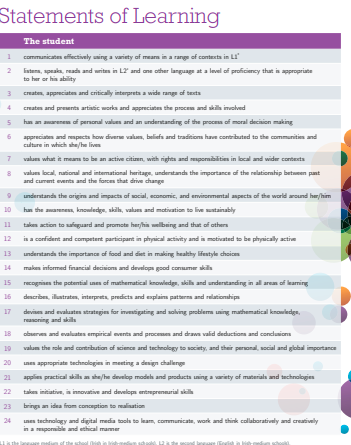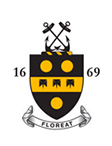The Junior Cycle programme is designed to provide students age 12 to 15 with a broad and balanced education. It seeks to promote creativity, critical thinking and effective communication skills.
Subject choice/curriculum in DGS
In Drogheda Grammar School the core subjects include:
- English
- Irish
- Mathematics
- Science
- History
- Geography
- Physical Education
- Wellbeing
In addition, students choose three option subjects from:
- Music
- Art
- Technical Graphics
- Wood Technology
- Business
- Home Economics
- French
- Spanish
They also complete two short courses in:
- Civic, Social and Political Education (CSPE)
- Coding
In 2015 The National Council for Curriculum and Assessment (NCCA) published The Framework for Junior Cycle. It outlined the various elements in the programme including;

Assessment and Reporting
Junior Cycle students are introduced to a new approach to assessment called Classroom-Based Assessments (CBA’s). These assessments are designed to provide students with the opportunity to demonstrate their learning and skills in real-world contexts. They focus on various areas including oral communication, research, and creativity.
In addition to CBA’s students will take final state examinations in a selection of subjects. These Junior Cycle exams take place in June of the third year and are an essential part of the Junior Cycle curriculum.
Students will receive a Junior Cycle Profile of Achievement (JCPA) after three years. They are graded in four different areas;
- Final state exams in the subjects they studied
- Subject and Short Course Classroom Based Assessments (CBA’s)
- Wellbeing
- Any Other Learning Experiences including extra-curricular activities, non-exam subjects and life skills

The JCPA is compiled by the school and issued to all students after the release of the provisional exam results by the Department of Education.
Classroom Based Assessments (CBA’s)
CBA’s are scheduled with the guidance of a national timetable. They must be completed within a prescribed time period; in most subjects this is three weeks.
CBA’s are to be done within class contact time but students may carry out additional practice for oral presentations outside of class.
Students do one CBA in second year and one CBA in third year.
CBA Timetable 2025/2026
The Drogheda Grammar School CBA calendar for second and third year students in 2025-2026 details are as follows:
There are four grade descriptors that can be awarded by a teacher for Junior Cycle CBA’s.
- Exceptional
- Above Expectations
- In Line with Expectations
- Yet to Meet Expectations
Assessment Task
Students in third year complete an Assessment Task, in some subjects, after they have finished their second CBA. Assessment Tasks are worth 10% of the overall mark for that subject. They are completed in class and are marked by the State Examination Commission.
State Exams
State Certified Final Exams are sat at the end of third year.
Exam duration is two hours or less.
Results of these exams are released in the autumn and will appear on a student’s JCPA.

Key Skills and Key Statements
During the Junior Cycle, students will develop Key Skills in areas such as communication, problem-solving, and information processing. Key Skills are vital for lifelong learning and personal development.

Key Statements are descriptors of the knowledge, skills, and values students should acquire during the Junior Cycle. They help track your child's progress and development in various subjects.

Wellbeing
At Drogheda Grammar school the wellbeing of your child is a top priority. The Junior Cycle programme promotes emotional, social and physical wellbeing through various initiatives and subjects like Physical Education and Wellbeing classes.
How can parents support?
- Stay Informed: Regularly check the school's communication channels for updates and important dates.
- Encourage Study Habits: Help your child establish good study routines and create a quiet, organised study space at home.
- Attend Parent-Teacher Meetings: These meetings provide valuable insights into your child's progress and areas of improvement.
- Ask Questions: If you have concerns or questions about your child's education, don't hesitate to contact the school.





